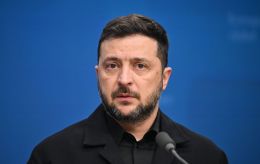Putin could simulate talks but won't accept US peace terms - political expert Ivan Preobrazhensky
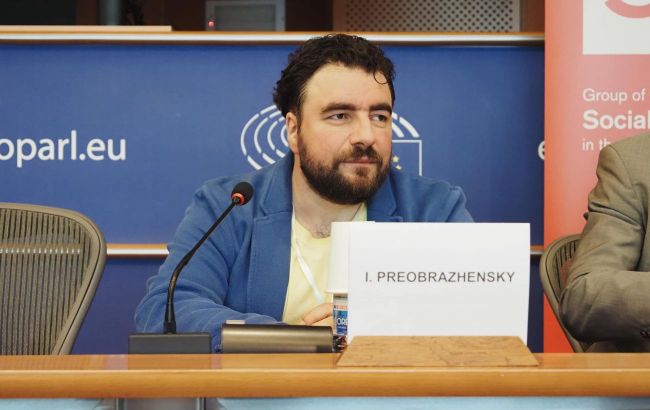 Ivan Preobrazhensky (photo: Facebook)
Ivan Preobrazhensky (photo: Facebook)
The United States has proposed another peace plan and wants both Russia and Ukraine to agree to it. Why these negotiations may fail, what is happening inside the Kremlin, and how Trump could pressure Putin — political scientist Ivan Preobrazhensky explained in an interview with RBC-Ukraine.
Key questions:
-
What the Kremlin is counting on and where the negotiations could lead
-
How the leaked calls of Dmitriev, Ushakov, and Witkoff will affect the current situation
-
What Trump’s relationship with Putin is like, and can the US president influence the Russian leader
-
What is happening with the Russian economy, and why Moscow is mobilizing reservists
-
Under what conditions Putin would sit down at the negotiating table
Another peace plan to end Russia’s war against Ukraine appeared in the media on November 19. It consisted of 28 points that Kyiv was offered by American partners. In parallel, a US delegation arrived in Ukraine — this time, military officials.
At the same time, the plan mostly repeated Russia’s demands on Ukraine made at different points during the war, rather than offering a compromise between the sides. Later, it became known that Russia had indeed written most of the plan, and Washington only added a few points. And while compromise may be possible on most of them, there are three points on which both Russia and Ukraine will stand firm until the end — the main one being the status of occupied territories.
Why the next round of talks will most likely lead to nothing, what the Kremlin is counting on, and whether Trump has leverage over Putin — Russian opposition political analyst Ivan Preobrazhensky explained in an interview with RBC-Ukraine.
— Regarding today’s situation with the negotiations, does it look like we are moving toward something? Or is this another meaningless discussion that will end with nothing?
— I believe it will end with nothing. Most likely, once it comes to direct talks with Russia, it will deny authorship of this plan, deny acceptance of it, and deny whatever agreements may have been reached by that point.
It is absolutely clear that the Kremlin expected that about 90% of its version would remain. Otherwise, it had no intention of agreeing to anything. And while everything is moving forward, President Zelenskyy is in a situation where he cannot refuse. Therefore, he will participate in the negotiations until the very end, trying to remove some points, change others, and generally engage fully in the talks.
Everyone most likely understands that the negotiations will lead nowhere. But there remains a one-percent chance, so to speak, that some result will emerge. And you cannot simply let that go. You cannot hand over the situation entirely to Witkoff or people from the US administration.
— Why did this topic come up again? There are several versions. First — Kyiv initiated discussion of the peace plan because of the corruption scandal; second — Trump, due to his internal problems; third — Russia, because new sanctions were being discussed again. Or perhaps all three converged at one point.
— I think all three really converged at one point. Trump urgently needs to achieve some major success by the end of the year, and then publish the so-called Epstein dossier, which, no matter what it contains, would provoke another scandal. And on the backdrop of the Epstein files, his rating in the US dropped significantly. So he was inclined to agree to any proposal that could change the public agenda in the United States.
Not for nothing, his critics from former MAGA allies accuse him of focusing too much on foreign policy — supposedly like Biden — and not doing what he promised domestically. Not doing enough.

Donald Trump (photo: Getty Images)
At the same time, a major corruption scandal erupted in Ukraine, and the Kremlin could not ignore it. Both Russian and likely American sides hoped that Zelenskyy and his circle might suddenly become more flexible than before. Many say that some members of the Ukrainian delegation, such as Umerov — and maybe others — were allegedly guaranteed safety and immunity. Accordingly, they also had to take part in the talks.
And the Kremlin, which decided to seize the moment, reacted quickly and effectively to the situation in the US and Ukraine, and quickly pushed its plan through. And, as you see, it hardly differs from previous Russian proposals. The difference is minimal. All these factors aligned.
At the same time, the Kremlin wouldn’t mind ending hostilities temporarily — on its terms — to regroup, strengthen the economy, and so on. But only on its conditions. That’s when it seemed to them that this was achievable.
— What is more important for Russia — to have time to regroup or to ease sanctions?
— It depends on which sanctions. For example, European sanctions cannot be eased without approval from the European Union. And aside from new US sanctions, most of the sanctions that hurt Russia the most are European, primarily financial sanctions. Some have been in place since 2014. And the Kremlin very much wants them lifted. That would allow it to return to global financial markets and bring money into the economy. So all these things are important to varying degrees.
It is important to demonstrate some kind of victory. Because anti-war — or more accurately, pacifist — sentiments in Russia are slowly growing, despite the Kremlin’s ability to suppress them. And the authorities would like to contain them. Not accidentally do they speak about these issues publicly.
The ideal scenario would be some form of ceasefire that would partially ease sanctions, allow the industry to regroup, stop the economic decline, and meet public expectations.
Another telling point — when Russians stop believing that Trump can achieve a peace agreement, his rating falls specifically in Russia. So they clearly relied on him. For them, he is the only person who could force Putin to stop the war. Russians do not see themselves as a political subject — and indeed, they are not.
— Do they expect Trump to pressure Putin or Zelenskyy?
— Frankly, they don’t care.
— Do they want Ukraine's capitulation, or do they just want this to be over?
— Most people just want it to end. If it ends with Ukraine’s capitulation, of course most will rejoice. People usually rejoice at military victories. And if Russia has to give up something, most won’t be upset either. There would be no serious protests even if they had to give up the occupied part of the Zaporizhzhia region.
— And if Crimea?
— Even Crimea. I think this issue died in the first year of the full-scale invasion, when Crimea became just one of the occupied territories like all the others. There will be a bit more discontent, of course, but the “Crimea consensus” of 2014 is long gone.
The issue is different — Putin will not accept this. And everyone understands it. Thus, everyone lives with a hostage mindset. At the same time, the public will oppose anything that looks like surrendering the gains of the war, because they are convinced that Putin will not accept such moves, and they try to stay ahead of him, satisfying what they believe to be his wishes.
– And regarding these 28 points that existed from the beginning, is this more of the Russian agenda, or something in between Russia’s demands and US compromises?
– I think it’s approximately like the theatrical metaphor about a stove and how it will appear on stage. They ask — will it be white with a black spot? No, it will be black with a white one. This illustrates Dmitriev’s conversation about these proposals. Meaning yes, they counted on the fact that they would throw in the plan — it is clearly entirely their plan — but amendments had already been made to it by the American side even before any negotiations actually began.
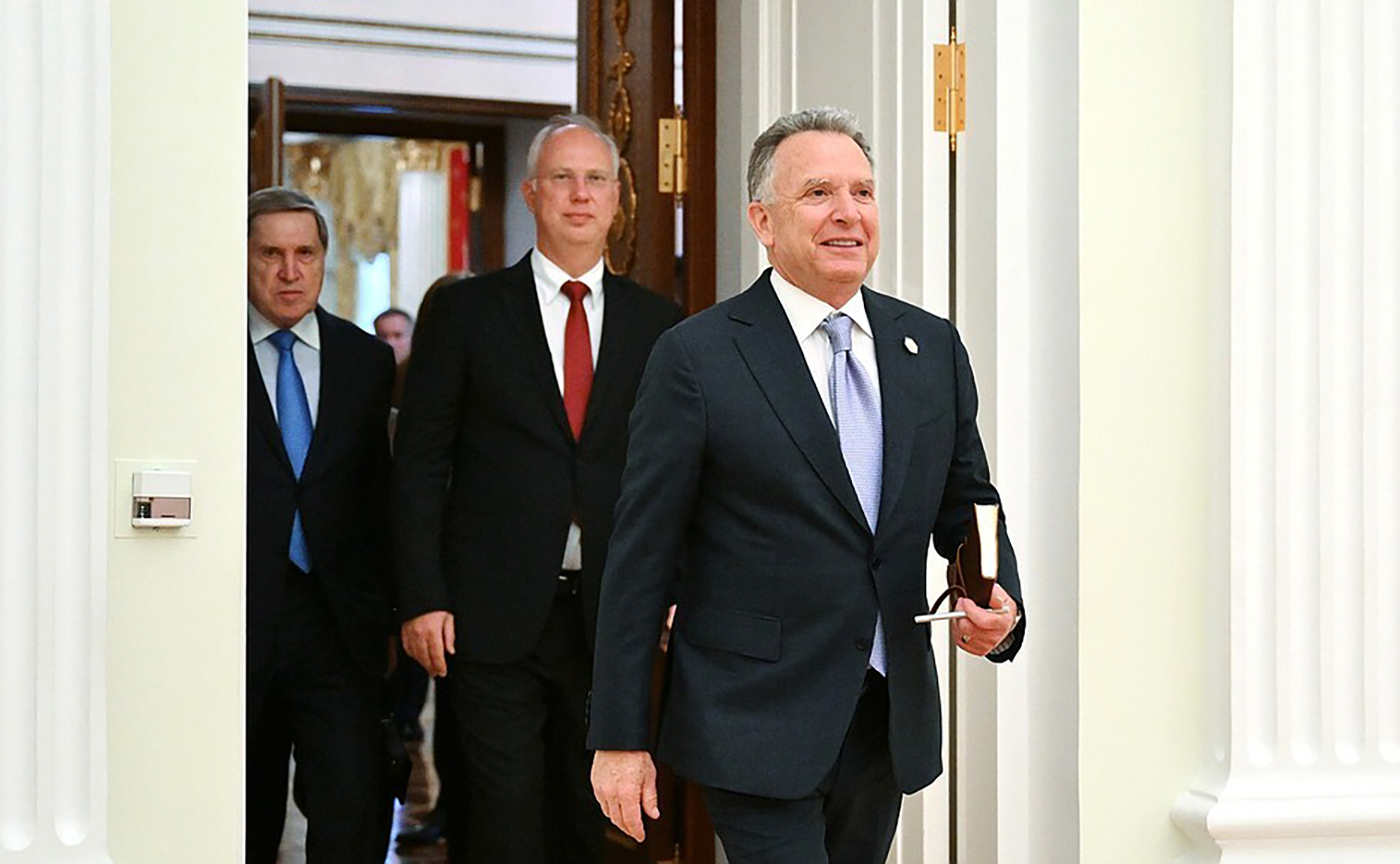
Steve Witkoff, Kirill Dmitriev, and Yuri Ushakov (photo: Getty Images)
But these amendments were obviously minor. They were simply meant, perhaps, to give this plan the appearance of something coming from the American side, or at least something neutral.
– It’s just hard to believe that after almost four years of war, our main ally is offering us a plan written by Russia.
– Because the main ally is, in a sense, an ally against his will. That is, the United States has its own interests. US legislators and US institutions protect American interests. Ultimately, American public opinion. Within a consolidated understanding of what America would like to achieve, it is clearly not Russia’s victory.
And Donald Trump’s interest lies in concluding any peace deal as quickly as possible, at any cost. And if he feels that it is easier to pressure Ukraine for this, he will pressure Ukraine for this. And there are also people in Donald Trump’s circle who, one can assume, are corrupted by Russia. For example, the key negotiator, Witkoff.
– So you think he is not ideological?
– I think he is not ideological; he had some joint business, perhaps something is being offered to him, and he is counting on some future benefit. There are various rumors about what he may be involved in and connected to. One way or another, this is already corruption. Even the potential benefit that may appear to him in the future, even a hint at such a benefit, is obviously total corruption.
There are probably others around Donald Trump who are also corrupt. Moreover, the proposals Russia is making to Trump are intended to corrupt him. Because we are talking about the possibility of obtaining large economic and financial gains from lifting sanctions and cooperating with Russia, and not for some abstract people, but, let’s say, private companies.
– In your column for Deutsche Welle, you end by saying that the Kremlin’s greed and overconfidence are so great that the negotiations may collapse. Do you still think so now?
– Yes, I have the full sense that the first Security Council meeting, when the negotiations had just resumed, Putin convened not to consult with anyone. He had already consulted earlier at closed meetings. And this was, so to speak, already the final decision he was announcing to them.
You can judge this by the statements of Russian representatives. Not by those who are involved in negotiations and whose success depends on the results of these negotiations. But by figures like the leader of the Kremlin’s pseudo-party, A Just Russia, Sergey Mironov, and various Russian bloggers, military propagandists, and so on. And they all quite clearly articulate one simple idea — if this plan ends up being in Ukraine’s favor, then Putin has no reason whatsoever to accept it.
I think that is exactly what Putin said. That if, based on these early negotiations by Ushakov and Dmitriev and on their conversations with Witkoff, they manage to make it a “white stove with a black spot,” then that suits them. If the final decision becomes a black-and-white stove, that no longer suits them.
If it is black with a white spot, meaning Russia obtains some limited benefits, but practically none of its main goals are achieved, then even more so, Putin will not accept this plan. Accordingly, Ushakov’s statement sounds exactly the same — we can, of course, discuss some things, but there are points that remain unacceptable. And every time the negotiations reach this exact stage. There remain 2–3 points, but these 2–3 points are obviously key. Essentially, these are questions of Ukraine’s sovereignty.
– Yes, that is exactly my next question. We again approached those three points — the critical issues for Ukraine: territories, the size of the Armed Forces, and NATO. So, as I understand it, we are entering a dead end again?
– Yes, that is exactly the case. There are critical, unacceptable points that essentially mean Ukraine’s capitulation. Even fixing the size of the army — that is obviously not capitulation, especially if the size is fixed not at around 600,000 but at around 800,000. And reserves and so on — everyone knows that this can always be bypassed. Just like after the collapse of the USSR, when Russia created a semi-military agency, the Ministry of Emergency Situations, increased the number of police, special forces, and so on. And later, when Russians entered Ukraine, they used a huge number of Interior Ministry forces, not just the Defense Ministry… Meaning all of this can be solved technically.
But the question of sovereignty, the question of the occupation of these territories and securing them for Russia — from the Kremlin’s standpoint, this is a critically important point, because Russia wants Ukraine to abandon its fortified areas in the Donetsk region.
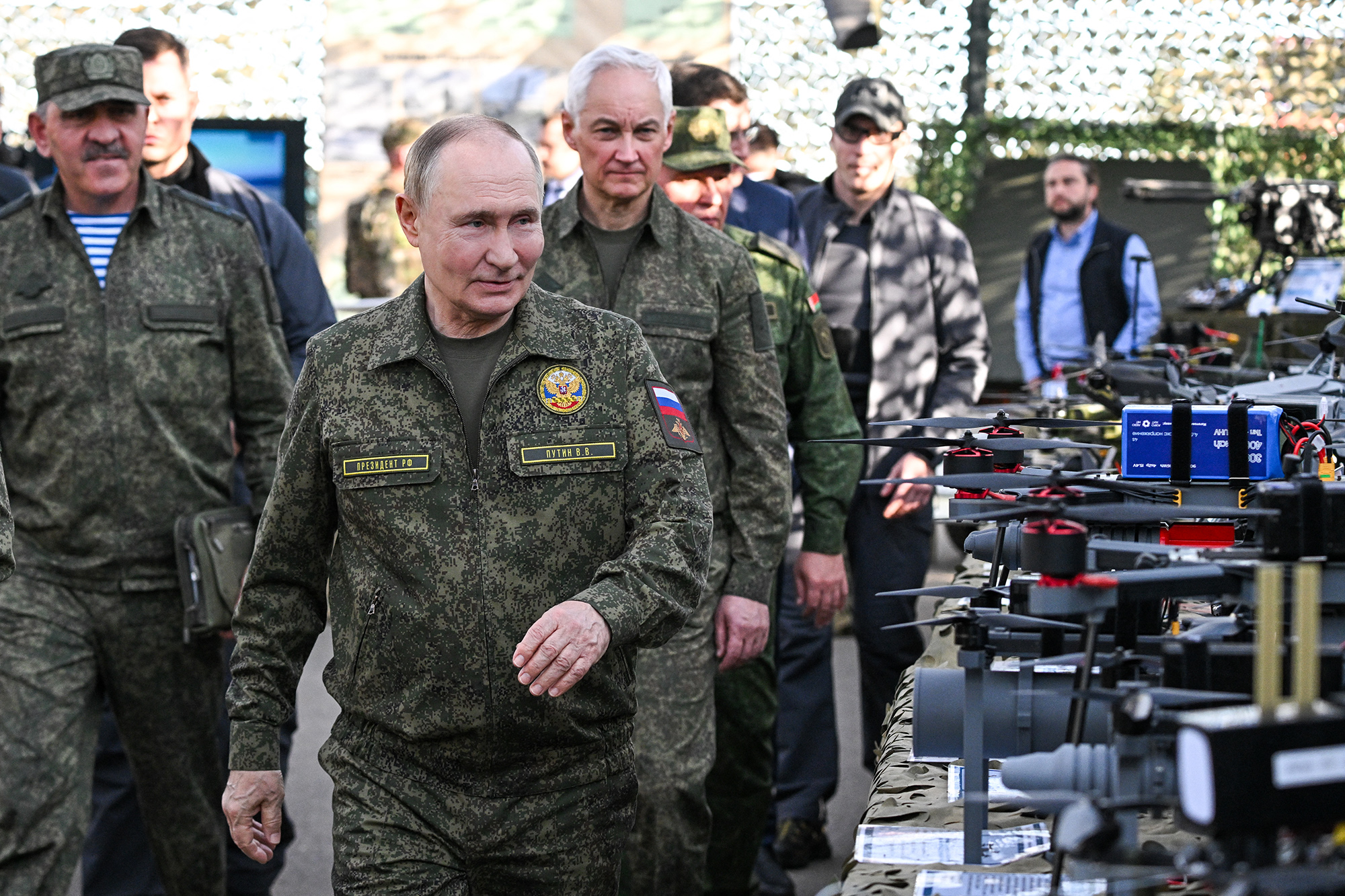
Vladimir Putin and Andrei Belousov (photo: Getty Images)
If we use historical analogies, in my view, this is most similar to the story of the Munich Agreement and the Czech defensive system. It was built in the west, north, and southwest of the country against Germany, and under the Munich Agreement, they had to abandon it. As a result, Czechoslovakia found itself deprived of the defensive system into which it had invested most of its budget over the previous 20 years. After they left those areas, German troops entered, and there was no chance of recreating the system.
The situation here is approximately the same. Meaning if Russia gains control over this territory, it immediately gains the ability to attack further into the Zaporizhzhia region, move into Dnipropetrovsk, and so on, freely and almost safely. The key point is that this can be done in six months or a year. Quickly recreating such a defensive system is very difficult. Russia itself demonstrated this when it created such a defensive system in the southeast that stopped Ukraine’s 2023 counteroffensive. Layered defense takes half a year to a year to build.
– At the same time, one of the points of the peace plan states that Russia undertakes not to attack further.
– There was this funny wording there, as I understand it, at the beginning — something like Russia will add this to its legislation; Vitkoff once talked about this. But in Russian legislation, for example, there is a clause stating that aggressive war is a crime, and Russian officials are supposed to prosecute Russian officials for this crime — which they are committing right now. Essentially, all the analogies are clear. It’s like signing the Budapest Memorandum once again, which no one will even ratify. And again, an agreement between Ukraine, the United States, and Russia cannot forbid or permit something to the European Union or NATO.
– And in terms of international law, this point contradicts it, because according to international law, other states cannot recognize occupied territories as belonging to the aggressor state. So if they recognize them, this gives a green light to other aggressors.
– Essentially, yes. And honestly, the United States itself has historically violated this. And perhaps for people like Trump and Putin, who live in the 19th century, this is absolutely normal. They once took Texas, they took Hawaii, basically they did the same themselves — well, and now let them (Russia – ed.) take things. And then there will be order, prosperity, I don’t know, they’ll open resorts there.
There is no understanding that there is a big difference between types of imperialist wars. That is, there is an imperialist war within an empire that is collapsing, being restored, or created. And there is an imperialist war that pursues concrete economic and political goals — to seize some territory, to secure oneself from neighbors.
Many compare the current war to the Soviet Union’s war against Finland. But the Soviet Union’s war against Finland from the very beginning did not aim for full occupation of Finland. That is, if it had worked out, Stalin, of course, would not have been against it. But in general, initially, they wanted to grab a piece of Finland and force Finland to be a dependent side.
And the Russian scheme in this case clearly envisions so-called returning. One should really listen to them — they do not hide their intentions. They want Ukraine to become part of conditional Russia or the Russian Empire or the Soviet Union — in this case it doesn’t matter what you call it. That is, this is the complete dismantling of Ukrainian statehood; it does not involve any federalization.
If Putin ever returns to the idea that it is possible to fully occupy Ukraine, install his own government, and stop there, then the likelihood of negotiations will significantly increase. But right now, this is not the case.
– And regarding the conversations between Ushakov, Dmitriev, and Vitkoff published by Bloomberg — do you think they can change the situation in anyone’s favor, and what conclusion can be drawn from these dialogues at all?
– The conclusion one can draw from these dialogues, which, it seems to me, has already long been made, is that between Donald Trump’s administration and Vladimir Putin there is a very active non-public dialogue at various levels, with the participation of unexpected people who hold no official positions — like Kirill Dmitriev, for example. This dialogue existed back in 2016, and since then, the contacts have not disappeared. Accordingly, unlike the European Union, Donald Trump does not engage in formal diplomacy at all. He does not consider it necessary.
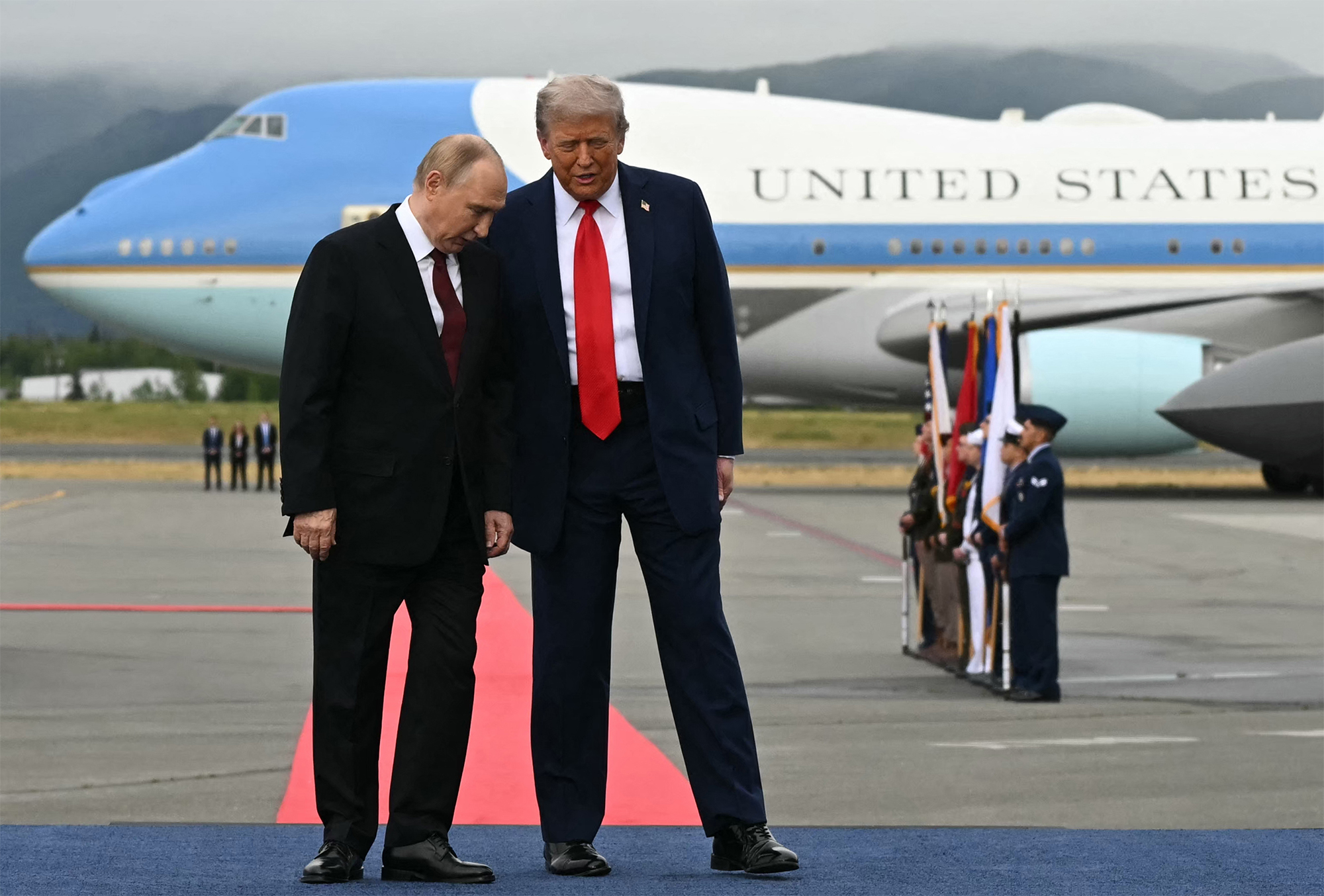
Donald Trump and Vladimir Putin at a meeting in Alaska (photo: Getty Images)
Moreover, he remembers that during his previous term, the State Department directly ignored his wishes, instructions, and demands, and influenced American policy. That is, he has long-standing grievances against professional diplomats, and he does not want them to influence his decisions. Accordingly, he does not trust his own people as much as he does not trust others.
– And will the situation change in any way after these dialogues?
– It’s unclear why it would change. Both Trump and Putin will obviously ignore this story. They have already called it fake through their representatives. Accordingly, there is no scandal, contrary to what many think. Trump will not be angry at Vitkoff for advising the Russians how to flatter Trump. Trump likes being flattered, so his subordinates are doing everything right.
Vitkoff told the Russians how to address the great president of the great United States of America. And this suits him completely.
Of course, if at some point Trump’s interest changes — more likely not in foreign policy but in domestic politics — then the situation may change sharply, and Vitkoff may face this as a problem. But right now, when Trump needs to divert attention from the domestic political situation by all means, from rising dissatisfaction with his policies, from political allies turning away from him — for him, any scandal is better than normalcy and stable diplomacy. If there will be quarrels because of this correspondence, great, let all the media write about only this.
– Returning to Russia: for a long time, there has been the view that there are two forces in the Kremlin — one could call one militarized and the other its opponent.
– I would say that there are people who are competent in at least something. Even the same Kirill Dmitriev or Ushakov. And there are people who have completely lost their competence. Or never had it. A separate group is those who believe it is beneficial for them that the war continues — those who somehow profit from it.
There are two completely obvious groups. There is one group for victory at any cost, which serves Putin. They think he has super-goals and is ready in reality to sacrifice anything to win, and believes that after victory, everything will recover. And there is a group that thinks that perhaps it is worth stopping for now.
– And does Putin belong to the first group, or is he somehow above the process?
– On the one hand, he is above the process; on the other hand, he is obviously part of the wing that advocates continuing the war.
– And do they influence him, or does he influence them?
– I think it’s a mutual influence. I think that on the one hand, they try to please him as much as possible. And on the other hand, he cannot live in a vacuum. He must sometimes consult someone and test his ideas on someone. But at the same time, when a person loses adequacy, he begins testing his ideas on those who agree with him.
That’s why someone like Dmitry Kozak gets expelled from the presidential administration. Simply because he is a person who has always believed that there are no problems that could not be solved through negotiations and corruption. There is no need to fight.
– And what is happening now with the Russian economy? Is this a planned deterioration, or are they still keeping it afloat?
– There is an accelerated deterioration. Using the new Russian terminology, this is negative growth. We see a clear acceleration of negative growth, because in one way or another a few sectors like banking are staying afloat, but in all others there is a house-of-cards effect. That is, something collapses somewhere, and as a result, the inflow of money into another sector dries up. Roughly speaking, industry affects construction — there is no construction market, no market for building materials. No building materials market means it affects the extractive-industries market, and so on.
Accordingly, this house-of-cards effect is seen in all sectors. The number of enterprises that stop paying salaries is increasing. And everything together gives a negative effect. But Putin is convinced that it will bounce back and recover — that one just needs to endure. It has always been this way; it will be this way again. If the economy is not overregulated — which he prevents through administrative-command, Soviet-style methods — it will heal itself.
– Is that true?
– No, it is not true in the sense that it is not always so; otherwise, relatively market economies would not have such crises that lead to changes of power. The Great Depression in the US would not have occurred, and so on. As for how hopeless the Russian situation is and when it will lead to a deep crisis, this is very hard to say. We do not see all the resources; statistics are totally falsified. They themselves likely do not fully understand it.
But one optimistic factor is that adequate economists, autocrats in Putin’s circle, technocrats like Nabiullina, are sounding all the alarms. They regularly say that the problems are increasing and something must be done. And Putin does not react. And there is hope that just as Putin can ruin negotiations that would be beneficial to him from a rational standpoint, he can also ruin the economy, which otherwise would withstand the crisis if supported with proper methods.
– Regarding reservists, recently, there was information that the Kremlin is mobilizing them more and more. Does this indicate that the human resource is critically lacking?
– Well, the depletion of this pool of mercenaries ready to go fight is clearly happening in certain regions. It has almost run out. Accordingly, they need to look for new sources of human material — cannon fodder. And so far, they are apparently finding them without announcing mobilization. For Putin, announcing mobilization has become a kind of taboo. Accordingly, they keep inventing new ways to mobilize someone without announcing the mobilization.
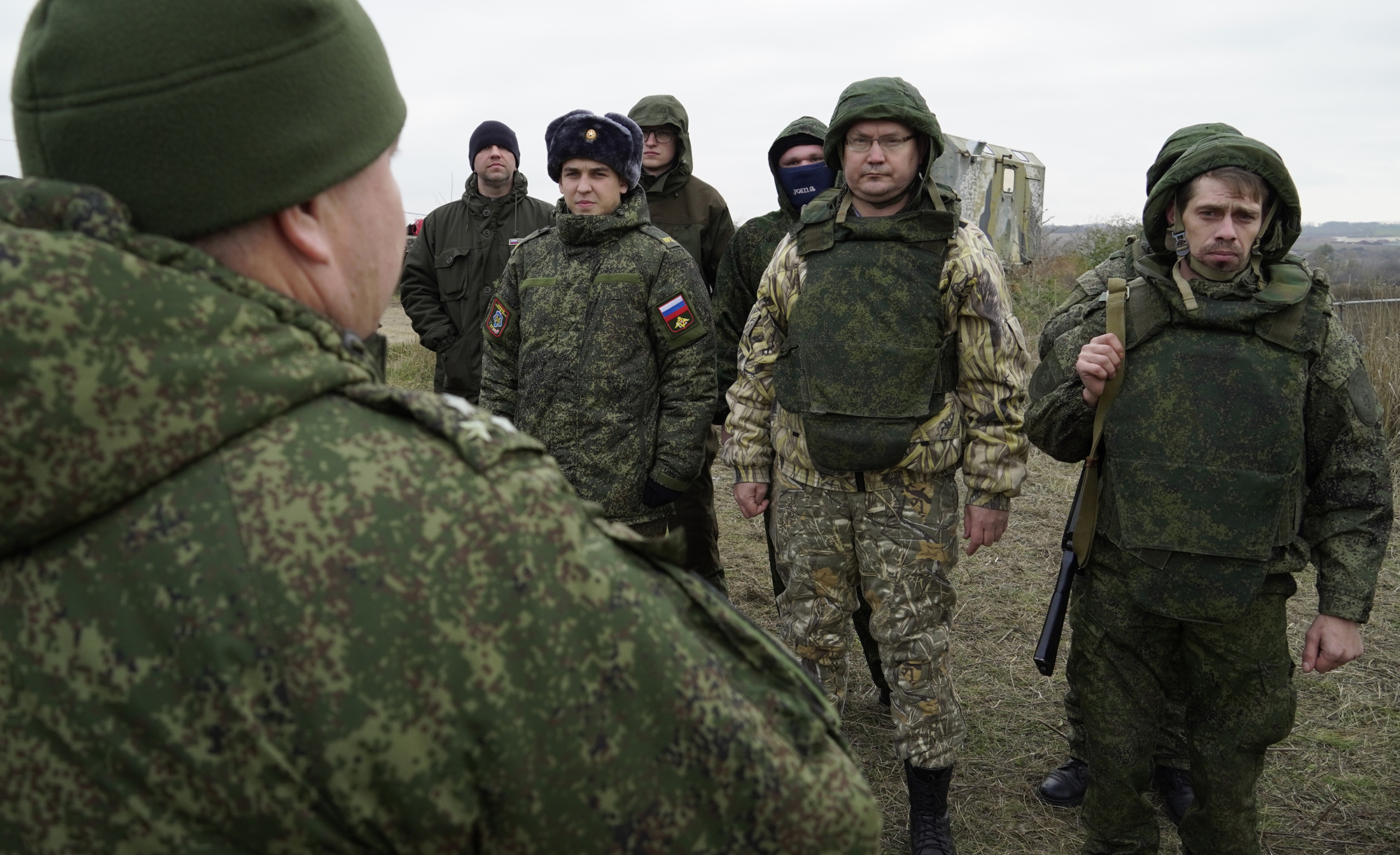
Russian military during exercises in Rostov (photo: Getty Images)
– But this is a process that must have some kind of end. Sooner or later, they will have to either announce it or that’s it.
– They think this through in advance. There are certain forecasts, analyses, and, in principle, many methods. As it’s called in economics, if you can’t increase demand, you can create it artificially by introducing certain restrictive measures. This is an artificial monopoly, so to speak. The same is happening here. There are measures that allow them to drive some additional number of people to the front.
That is, what do we see? We see that, for example, at the AvtoVAZ plant, the largest Russian car manufacturer, the only one that still produces something, people are being massively laid off, because production is falling. Accordingly, they are being sent on unpaid leave, etc.
Are there that many jobs in the impoverished city of Tolyatti or in Samara to employ these people? No. Consequently, some of them will inevitably end up among the mercenaries, because they have families to feed, children get sick, there are mortgages, etc. They will find plenty of justifications for themselves. The main thing is that it is a quick source of income.
– To go fight.
– Yes. The same applies to some miners who haven’t been paid salaries for almost a year. And this suits Putin, meaning this economic decline simultaneously turns into a pressure mechanism that squeezes from the population some additional number of mercenaries for the war.
– If we talk about the relationship between Putin and Trump. There are critical points: we won’t go for them, Trump will try to pressure us, we can somehow endure it; he will start to pressure Putin, and Putin refuses him. What then?
– I think Trump will, again and again, wave after wave, try to negotiate with Putin on Putin’s terms, but at the same time, it’s quite likely that sanctions and some alternative pressure mechanisms will gradually increase. He will not abandon this path, because it’s the simplest one.
And overall, Trump needs very little. He doesn’t need real peace; he needs an agreement signed by Zelenskyy and Putin. Whether it will be fulfilled or not, or what will be written in it specifically, this, frankly, does not interest him at all. He needs to go to the podium and say: “I made peace.” Report to his voters, to the American establishment. But Trump cannot and does not want to fully give up Ukraine simply because he understands what this threatens him with at home – major political problems.
– They say that only Trump and China can influence Putin. But what leverage does Trump have to influence Putin? Only sanctions?
– He has sanctions, he has the ability to apply political and geographical pressure, I would call it that. That is, cutting off the Kremlin’s “tails” or “tentacles” around the world. Well, for instance, Trump has his own problem with Venezuela. At the same time, Venezuela is a huge source of black income for the Kremlin — essentially a black oil cashbox. If Trump eventually destroys the Maduro regime, the Kremlin will lose one of its economic and foreign-policy resources. And it will become clear that it could not protect someone.
Accordingly, growing problems will begin in the Kremlin’s other strongholds, say in Africa or other Latin American countries. In Mali, some Al-Qaeda groups, along with Tuaregs, blocked the capital, where the military junta sits. This junta cooperates with Putin and transferred to the Russians a huge number of local mines with minerals.
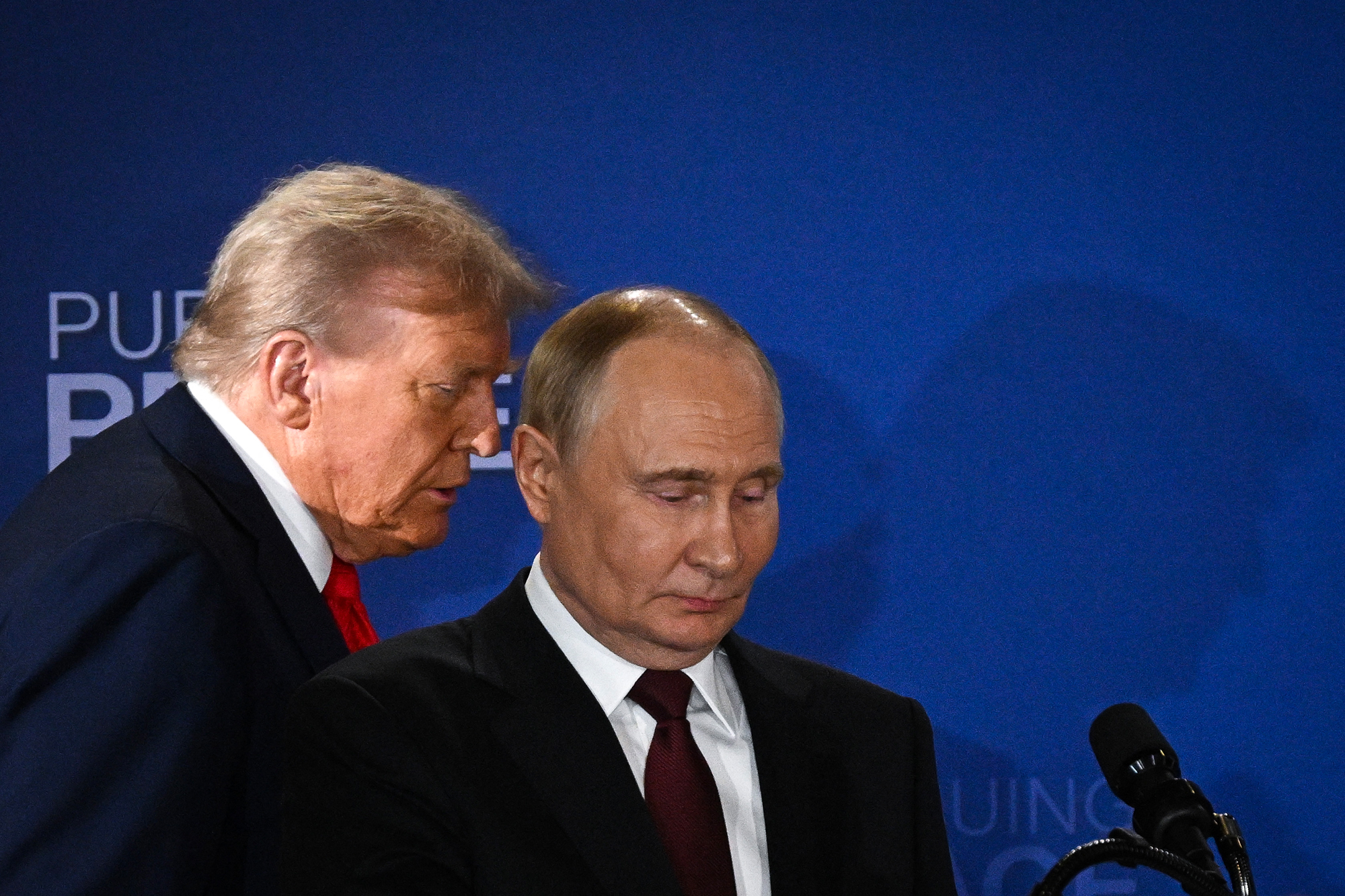
Trump and Putin (photo: Getty Images)
If this military junta is eventually toppled, then Russia will have a major loss of income that informally goes to the war — to purchase, for example, illegal technologies and goods that it does not produce. This will weaken its overall position in the Sahara and Sahel regions. Others will begin turning away from it because it cannot guarantee security despite its promises.
And the second tool is sanctions, and very targeted ones — like the most recent ones. These are probably the same sanctions that were introduced at the beginning of the full-scale aggression, that is, before the spring of 2022. These are the strongest real sanctions among those ever introduced.
– And do they even fear American sanctions in Russia at all?
– Well, in this form, yes, they fear them. We remember how recently Scott Bessent mocked the Europeans when he told them: if you are introducing the nineteenth package, then maybe you’re doing something wrong. Accordingly, the Americans rely on the fact that they know how to deliver truly painful blows.
– But they are not delivering them.
– They are not delivering them because there should be full-scale tough sanctions against Rosatom, which Ukraine has long demanded, and which no one wants to impose. If the situation continues to develop step by step as it is developing now, then at each next stage of negotiations, Trump will try to apply the next element of blackmail and will introduce another package of sanctions either before the negotiations or as a result of their failure.
The problem here is not that he will necessarily give in to Russia. Most likely not. The problem is that he is stretching out time this way, giving Putin the opportunity to continue resolving issues by military means, which is precisely what Putin wanted.
– And under what condition would Putin even sit at the negotiating table? Clearly, he is not ready to end the war now, we can see this. But what conditions must be created for him to sit at the table and start negotiations adequately?
– The minimally necessary conditions are increased sanctions pressure, and not only sanctions—a military defeat, meaning at least halting the offensive. And serious internal problems in Russia, for example, with the economy, or with recruiting mercenaries. A combination of these factors could create this ground.
Another condition is the US's willingness to lift all sanctions and to inject huge investments into Russia. The way Trump travels and gathers investments for the US — a trillion here, a trillion there. One day, Saudi Arabia promises something, another day Qatar. If such a pool of potential investors forms, or if Trump can somehow provide it himself, that is also a possible scenario. This is what Kirill Dmitriev clearly proposed at first. But there is no visible pool of investors; no one wants to invest in Russia.
– Is there any chance of success for this peace plan?
– This peace plan has a chance of reaching Russia and being accepted by Russia only if the Americans manage to push through the Russian position that existed initially. There is a micro-chance, I don’t know, two or three percent, that Russia will still sit at the negotiating table and will at least imitate negotiations for some time. The chances that it will be implemented in its pure form as a peace agreement that both sides will sign and a ceasefire — there are no such chances.

